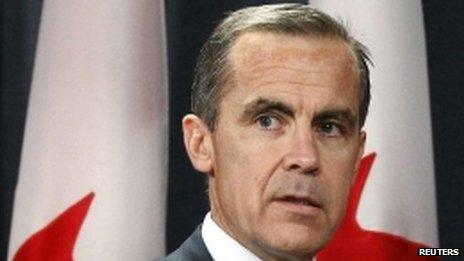Profile: Mark Carney
- Published

Mark Carney, the new governor of the Bank of England, is Canadian but intends to apply for British citizenship
The Bank of England's new governor, Mark Carney, has been described as the best central banker in the world.
Currently the head of Canada's central bank, he will take over from Sir Mervyn King, the current Bank of England chief, when he retires in June next year.
Mr Carney was one of five possible candidates whose skills were deemed sufficient to meet the challenges of the top job - a job which will become far bigger next year when the Bank takes back responsibility for regulation from the Financial Services Authority, which is being closed.
He is the eighth governor of the Bank of Canada, where he is five years into a seven-year term.
Nationality
Born in Canada in 1965, Mr Carney is the son of a school teacher.
He was born in the small town of Fort Smith, Northwest Territories but is no stranger to the UK.
All three of his degrees are in economics, his first from Harvard, but his masters and doctorate were both gained at Oxford University.
He also spent time in the UK during his 13 years with the investment bank, Goldman Sachs, which took him to London, Tokyo, New York and Toronto.
And his links are bolstered by the fact he has a British wife.
Indeed, they can only get stronger - he is expected to apply to become a British citizen.
The citizenship test given to candidates is unlikely to present a problem.
Influence
The Bank of England job is not the first non-Canadian post he has been considered for.
He was also a candidate for the job as managing director of the International Monetary Fund, a job that went to Christine Lagarde.
Mr Carney was once listed by Time Magazine as one of the 25 most influential people in the world.
A fluent French speaker, Mr Carney was appointed deputy governor at the Bank of Canada in 2003, spending a year there before becoming senior associate deputy minister of finance until his appointment to the central bank's top job.
As well as being the head of the Bank of Canada, he serves as chairman of the Basel-based Financial Stability Board (FSB) and as a member of the board of directors of the Bank for International Settlements (BIS).
Credit
He has a huge amount of respect among his peers.
Canada's banks avoided going down the route of those of many developed countries, keeping higher stocks of good quality assets partly thanks to a tighter grip on regulation - much of the credit for which is laid at his door.
He has a certain amount of intellectual and emotional distance from the banking world he inhabits.
He said the Occupy anti-capitalist protesters were engaged in a "democratic expression of views'' and were "entirely constructive".
He also reportedly had such a set-to with giant bank JP Morgan Chase's boss Jamie Dimon over regulatory reforms that another banking chief was said to have had to email him to patch things up.
His salary by most standards - although not the City's - is very generous.
The BBC understands he will be offered a total pay package worth about £624,000. In comparison, Sir Mervyn's salary is £305,000 a year, but he also receives generous pension contributions making his total pay and pension package worth about £519,000.
However, Mr Carney may well have to work harder than him for his money throughout the five years he is planning to stay as governor of the Bank of England.
- Published26 November 2012